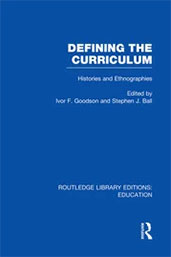Defining the Curriculum: histories and ethnographies
Subjects for Study: towards a social history of curriculum
In the curriculum histories undertaken, I focussed on subject groups and sub-groups in action. The particular historical context was the emergence of the environment as an influential idea and area of concern and of environmental education as a viable curriculum possibility. The location of the environmental climate of opinion within a broader structural milieu has been dealt with in a number of studies but here my particular concern was to understand how subject groups and sub-groups responded to the change in 'climate' (one subject advocate spoke of the 'changing climate' and argued that his subject group would have to 'adapt or perish'); beyond this was the need to investigate the manner in which the subject groups and sub-groups scrutinized the new climate for opportunities of promoting their interests; and why it was that one sub-group decided to promote a new subject at A-level in 'environmental studies' while other sub-groups and subject groups responded so strongly against this initiative as to threaten its viability.
Eventually a strategy for this historical investigation was designed and divided into three sections which aimed to focus on the conflict over environmental studies in the 1960s and 1970s. Beyond this paramount concern, where possible, the sections were designed so as to test hypotheses and to examine theories which related to the content studied. The first and second sections focussed on the origins and evolution of the three subjects involved in the emergence of environmental studies: geography, biology and rural studies. Here the concern was to understand the process of becoming a school subject and patterns of internal change. The third section dealt with 'external relations' between subjects and with the conflict over environmental studies, in particular the moves to promote an A-level syllabus for the subject. Hence the sections evolve chronologically: the subjects are scrutinized under construction and as they pursue status and resources; the groups, traditions and alliances within subjects are analyzed; these subjects and groups are then analyzed in the culminating conflict over environmental studies. For the purposes of this paper I do not want to provide a summary account of School Subjects and Curriculum Change but rather to concentrate on the way in which in constructing that account hypotheses were tested and reformulated and theories examined.
